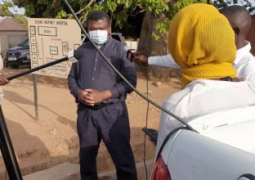Tim Butcher, Vintage Books, 2008, 364 pages
The River Congo, Africa grandest waterway never ceases to stir curiosity and awe among Europeans. Since 1871 when the explorer Stanley reported its existence to the Western World, this great African river, which has enough hydro electric potential to power the lights in the whole of Africa, the Congo River has remained a constant obsession with foreigners. Snaking through the DRC, formerly Zaire, the River straddles the equator twice and runs for over 4000 kms through forests, savannah and plateaux. This scenic sense makes it a great tourists attraction too. Sadly, the theater of war that DRC has become in the past decade, and its reputation of corruption and violence thanks to Mobutu’s venality, has taken away tourists.
Now only the desperately daredevils will want to sail along the great river. Tim Butcher, who was Africa correspondent for the London Telegraph newspaper in the early 2000s took six weeks off from his duty station in Johannesburg to try and follow the route that Stanley took in 1871. Nobody wanted to encourage him to take this journey, and no one thought he could travel the length of the River. Yet armed with just a rucksack and a few thousand dollars hidden in his boots, using all kinds of transport such as jeep, motorcycles, canoe and barges, assisted by a big cast of freelance guides, aid workers, priests and drifters, Butcher steadily followed in the footsteps of Stanley. He traveled from Kalemie to Boma, over 3000 kms of river and jungle.
Violence is the recurring theme in this travelogue. Ravaged by war since 1960, plagued by corruption and tyrannical rule under successive rulers like Mobutu (p. 122), DRC has become a symbol of all what is wrong in post independence Africa. The marauding rebels lurking in the forest around Bunia, or the remnants of the Hutu genocidiares are all in this cocktail of war and death that has plagued DRC. The author experiences all these, and he describes in moving detail the near death experiences he and his guides went through.
He also juxtaposes the poverty of the majority of the ordinary people he meets in his travels, with the filthy wealthy elite few, who have bled the country dry through mining contracts or deliberate theft from treasury. The sad lot of DRC comes out cleanly in this book.
I have read other books by people who traveled the River Congo such as Peter Forbat’s Congo River (1977) or Tayler’s Journey on the River Congo (2000), but Butchers seem by war the most exciting and touching. His story brings out both the beauty and fear that the River symbolizes. An excellent Christmas gift for a friend, I dare say.
Available at Timbooktoo. Tel 4494345.


